This dress is designed to fit 18-inch dolls with a soft body, such as American Girl, Our Generation, My Life As and similar dolls.
We used embroidery designs from the Folk-Style Embellishment Set. |
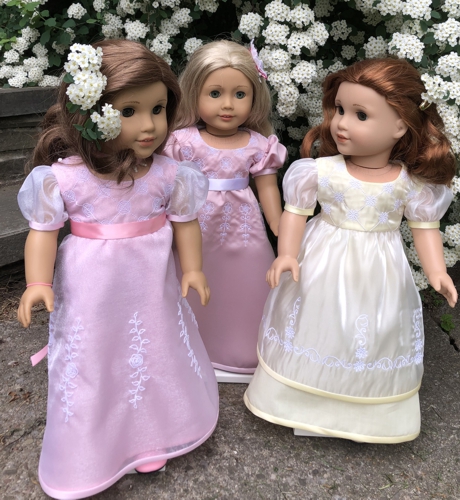
|
For each dress you will need :
- embroidery thread, either polyester or rayon , (you choose the color),
- about 1/2 yard of solid-colored light-weight fabric, such as light-weight cotton, cotton-polyester blend, silk, etc.,
- sheer organza if you want to make an overlay for the dress,
- small amount of lighter weight fabric (we used batiste) for the lining of the bodice,
- water-soluble mesh embroidery stabilizer,
- either sew-on snaps or ultra thin Velcro tape,
- satin bias tape in a color matching the fabric, we used single fold bias tape 5/8" wide
- chalk or graph pencil,
- small rotary cutter or scissors,
- sewing pins,
- iron,
- #12 universal needle,
- fray check glue,
- printer and paper.
|
The left dress is made of light-weight cotton with embroidered organza overlay. The right dress is made of medium weight polyester silk with embroidery right on the fabric.
|
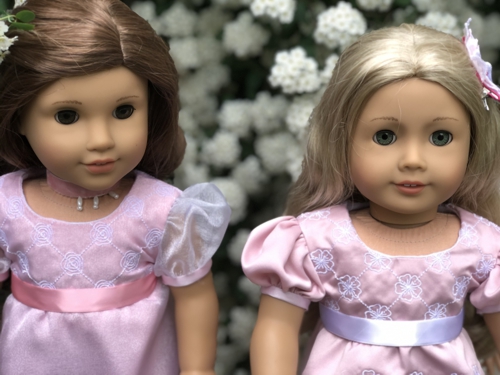
|
Patterns:
|
Download the template file for the dress. To open and print the template, which is a PDF file, you will need Adobe Reader or a similar program. Adobe Reader is free to download and install.
Template Download (PDF file)
|
Print out the templates and cut them out.
Note: Seam allowance of 1/4" is included in the templates.
|
The Bodice:
|
The bodices of all three dresses are sewn in the same way. The only exception is that the embroidery of one bodice is made right on the fabric, the other two have organza overlay.
|
Embroidery:
|
For the bodices we used the rectangular designs from the Folk-Style Embellishment Set.
On the working table, place 2 layers of water-soluble mesh stabilizer; a layer of light-weight fabric, right side up; and a layer of organza. The organza is optional. Hoop tightly and embroider the design of your choice.
For the bodice, you will need 2 similar stitch-outs.
Cut away all excess stabilizer and wash away the remainder.
|
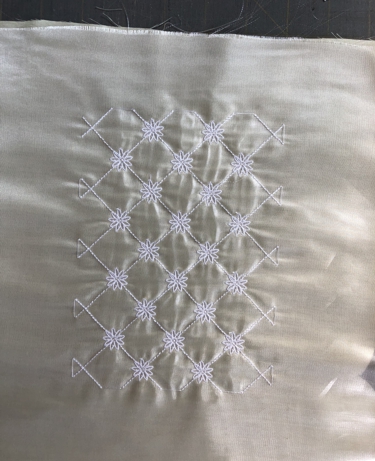
|
Cutting:
|
Position the paper template of the front on one of the stitch-outs. Trace and cut out.
|
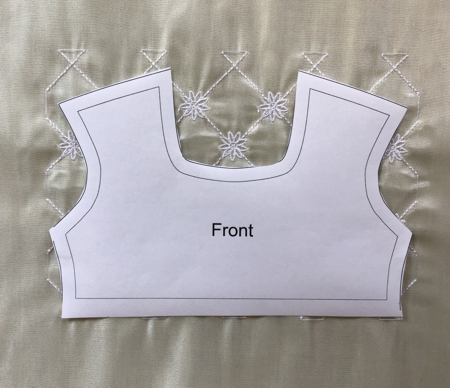
|
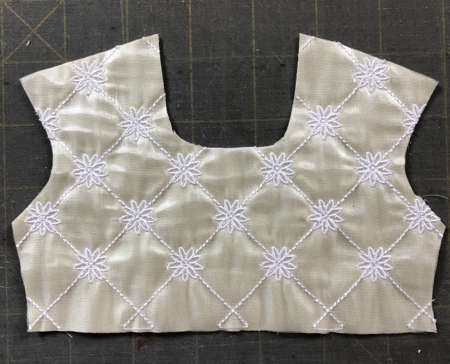
|
Use the second stitch-out for the back. Note that you will need to cut two back pieces that are mirror images. Position the back templates on the stitch-out.
|
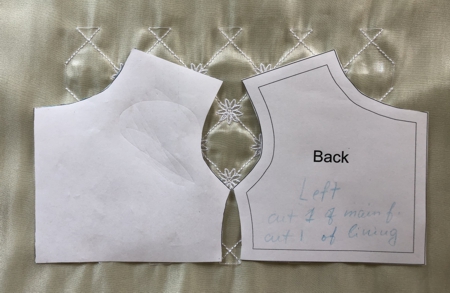
|
Trace and cut out.
|
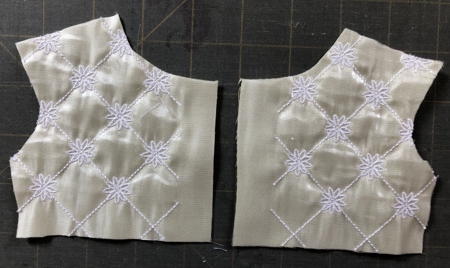
|
Use the same paper templates to cut the lining.
|
Assembly:
|
With right sides together, pin and sew the shoulder seams. Press them open. Repeat for the lining.
|
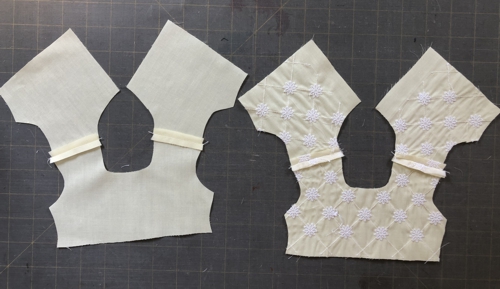
|
Staystitch along the armholes of the lining.
|
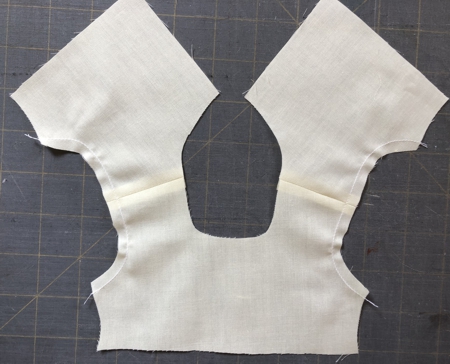
|
With right sides together, pin the bodice lining to the bodice along the neck and back opening.
|
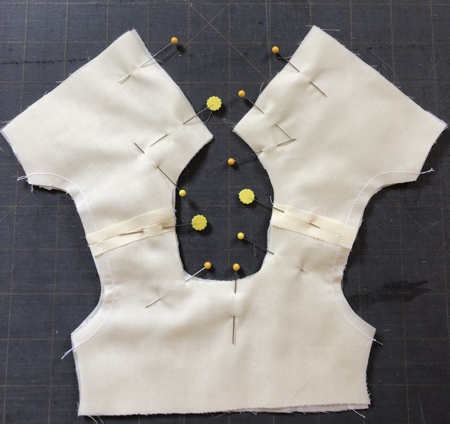
|
Topstitch along the edges.
Cut the corners and clip the curves, being careful not to cut through the stitching.
|
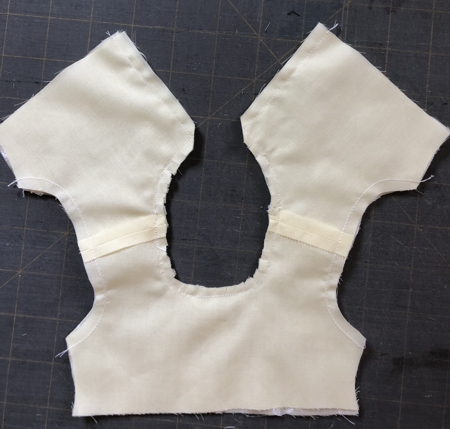
|
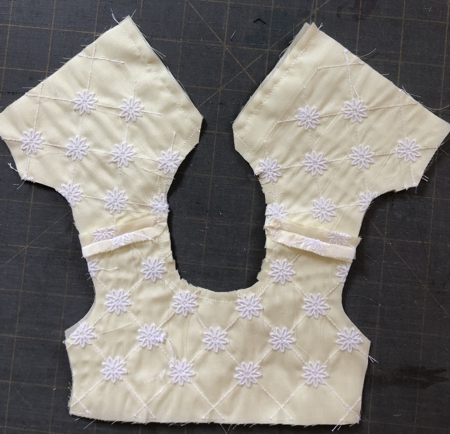
|
| Turn the working piece right side out. Take your time to straighten all corners and lines. Press. |
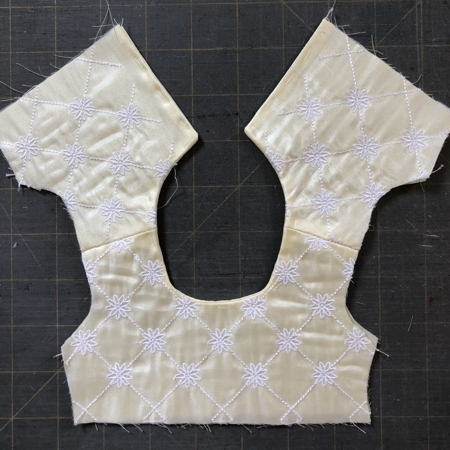
|
Sleeves
|
Using the paper template, cut 2 sleeves out of fabric.
Sew 2 rows of gathering between the gathering dots on the sleeve cap and hem at a scant 1/4".
|
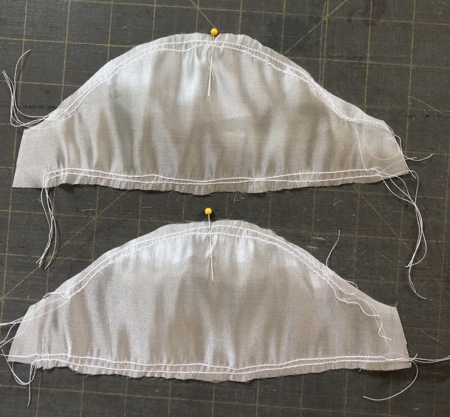
|
Out of satin bias tape, cut 2 sleeve bands 5" long. You can also cut the bands out of your main fabric; you will need 2 pieces measuring 1 1/2" x 5" each.
Pull the gathering threads on the hem of the sleeve and, with right sides together, pin the band to the bottom of the sleeve. Distribute the gathers evenly.
Topstitch in place, seam allowance 1/4".
Remove the gathering threads.
|
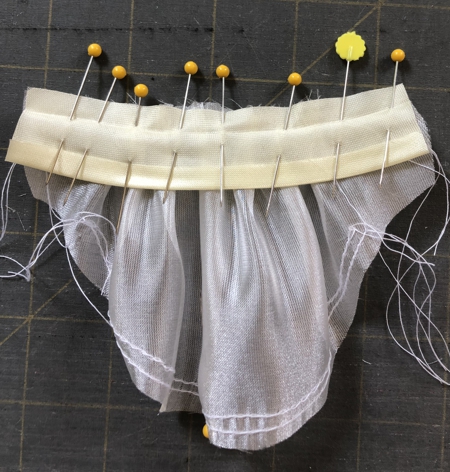
|
Fold the binding to the wrong side and handstitch in place.
Place a small amount of fray check on the sides of organza sleeves.
|
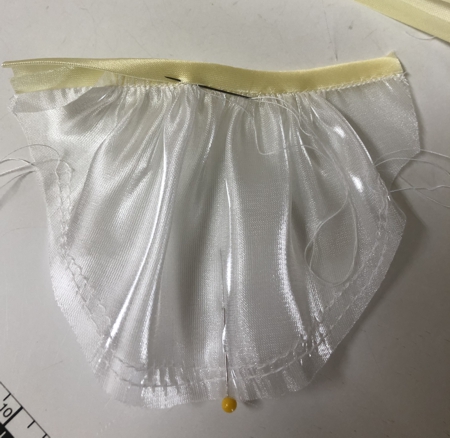
|
| If the sleeves are of heavier fabric, finish the sides with zig-zag stitch or on a serger. |
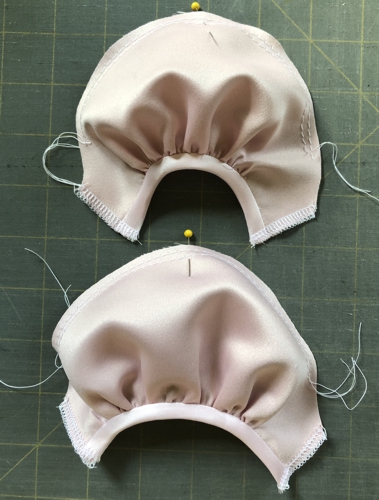
|
Fold the lining out of the way. With right sides together, pin the sleeve to the bodice, matching the center of the sleeve with the shoulder seam.Pull the gathering threads of the sleeve cap and distribute the gathers evenly.
|
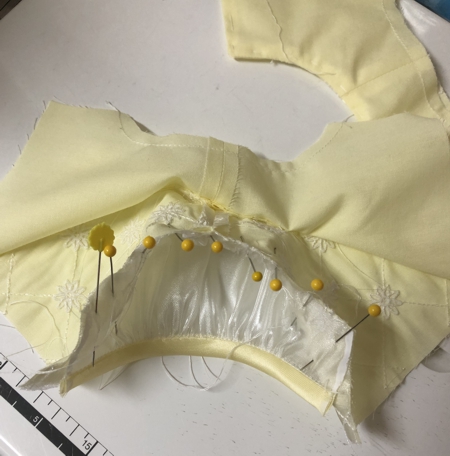
|
| Stitch. Repeat for other sleeve. Seam allowance is 1/4". Remove the gathering threads. Clip the curves. Press the seam allowance to the shoulder. Repeat for the other sleeve. |
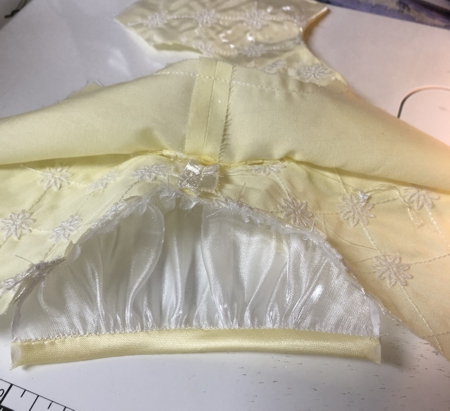
|
Both sleeves attached, right side view.
|
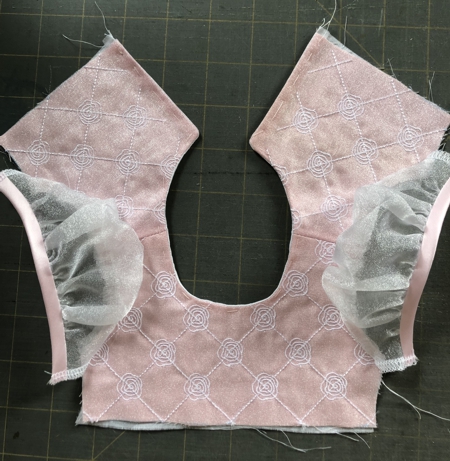
|
With right sides together,fold the lining out of way, pin from sleeve edge to side bottom. Stitch. Repeat on other side. Press the seams open.
|
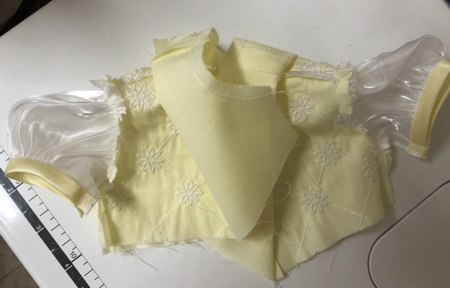
|
Fold the lining to align the sides, right side together. Stitch the sides. Press the seams open.
|
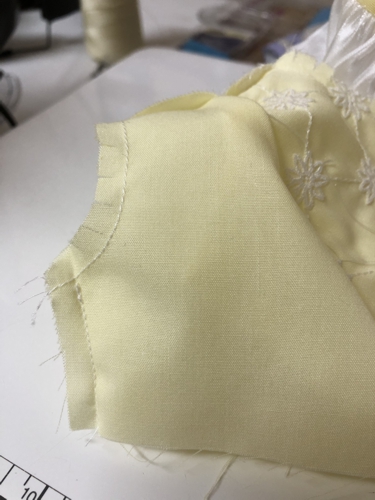
|
Fold the lining back. Clip the seam allowance of the armhole, taking care not to cut through the stitches.
Tuck the seam allowance inside. Handstitch the lining to the sleeve around the armhole.
|
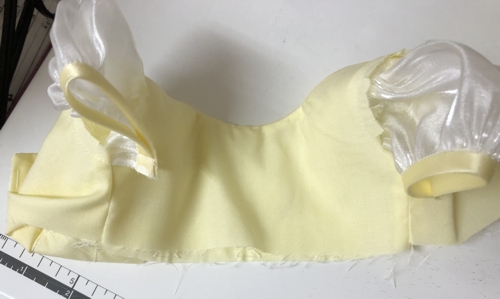
|
Skirt
|
The skirts of the dresses are made differently.
The yellow skirt features a short organza overlay with white embroidery. The hem of both skirt and overlay are finished with pale yellow satin bias tape.
|
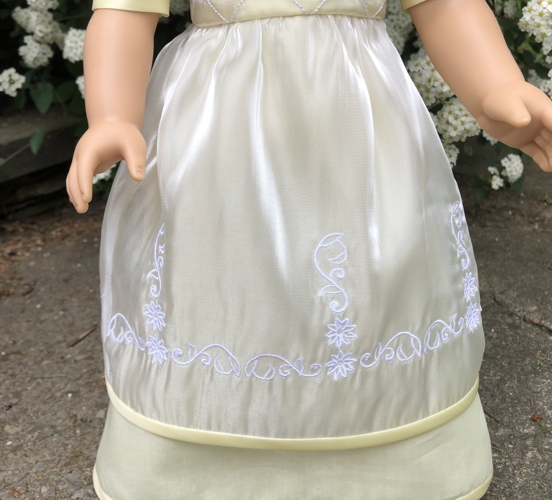
|
Using paper templates, cut 1 front and 2 back parts out of main fabric.
|
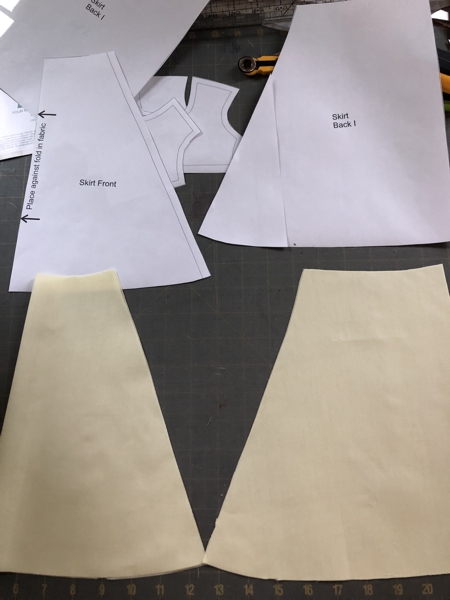
|
Using zig-zag stitch or serger finish the all sides of the skirt parts.
Sew the sides together, seam allowance 1/4", and press the seams open. Press the back opening sides 1/2" to the wrong side.
Sew 2 rows of gathering stitches along the waist edge between the folded side edges.
|
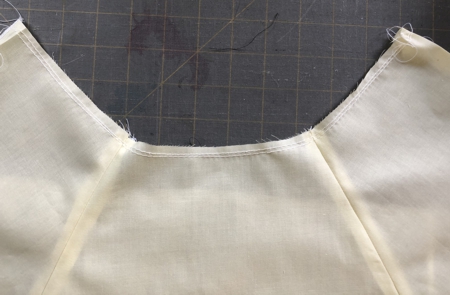
|
The short organza overlay consists of 3 rectangles and has side seams. Each rectangle is 8 1/2" wide and 11" long. You can make the overlay without seams if you manage to align the embroidery.
Decide on your embroidery patterns.
Hoop 2 layers of watersoluble mesh with a layer of organza. Embroider all designs you need.
Cut the embroidered piece into 3 pieces measuring 8 1/2" x 11", or one piece measuring 8 1/2" x 32"-33".
Sew the parts together, finish the raw edges.
Finish the hem with the bias tape. Sew 2 rows of gathering stitches along the waist edge. |
Match the center of the overlay with the center of the skirt's front.
|
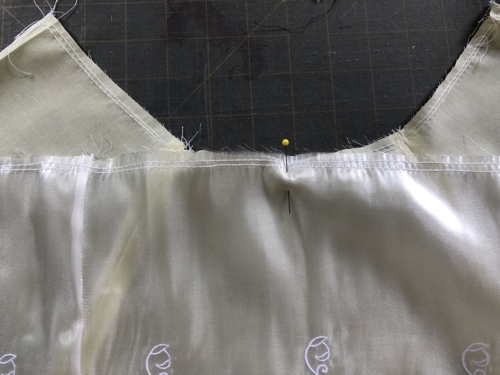
|
Fold the lining of the bodice out of the way. With right sides together, match the center of the bodice front with the center of the skirt. Pull up the gathers of the overlay to fit the bodice, then pull the skirt gathers to fit the bodice. Pin in place.
Be careful to line up the folded skirt edge and the bodice opening.
|
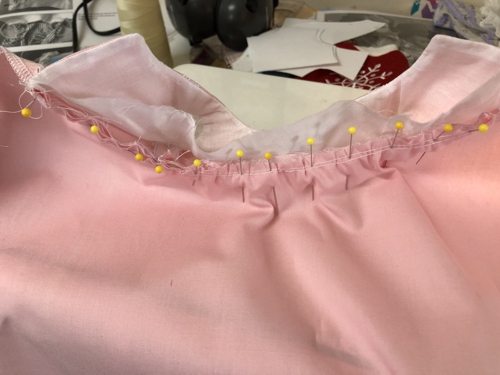
|
Stitch. Remove all gathering threads.
|
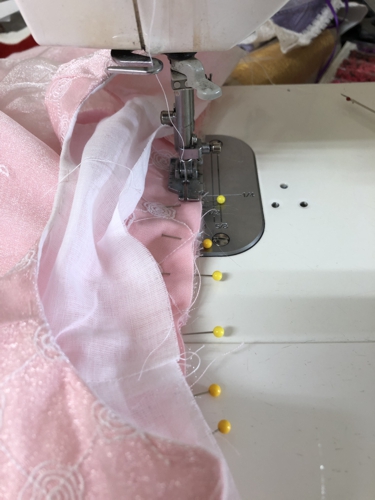
|
Fold the lining of the bodice back. Fold its raw edge 1/4" to the wrong side to cover the stitches. Baste. Stitch by hand the skirt.
|
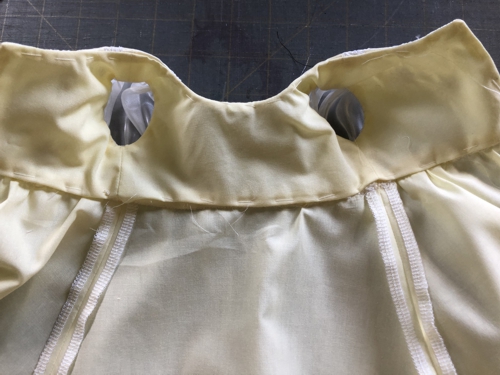
|
One of the pink dresses features organza overlay and organza sleeves. The other dress is made out of polyester silk with the embroidery right on this fabric. The bodices are made as described above.
|
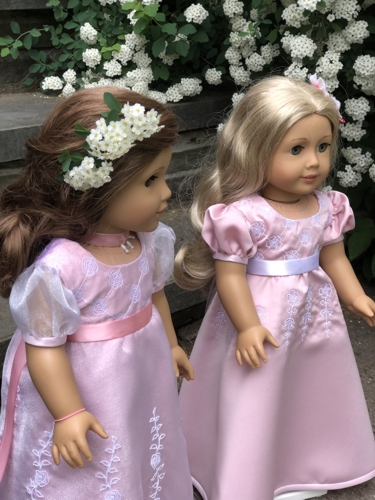
|
For the skirt of these dresses, we printed out the templates twice and glued them together.
|
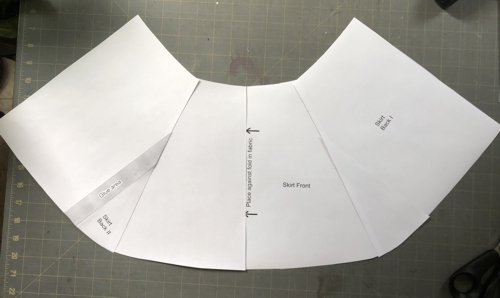
|
Pin the paper template over the fabric, organza or solid fabric, trace with pen/chalk or baste the outline. Do not cut it out yet.
Using paper print-outs of the designs, position them over the fabric.
Stabilize with 2 layers of water-soluble mesh and embroider one by one.
|
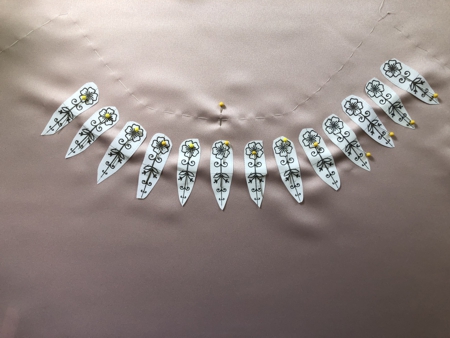
|
| Cut out the skirt and overlay. Remove the excess stabilizer and wash away the remainder. Leave to air dry. Press if needed. |
For the skirt without overlay, finish the back raw edges. Fold the edges 1/2" back and press.
|
For the skirt with overlay, using the same paper template, cut the fabric skirt. FInish the hem of the skirt - turn the edge 1/8" back and press, then turn again and press, sew in place by hand.
Finish the raw edge of the overlay with the satin bias tape.
Place the overlay over the skirt, pin together.
|
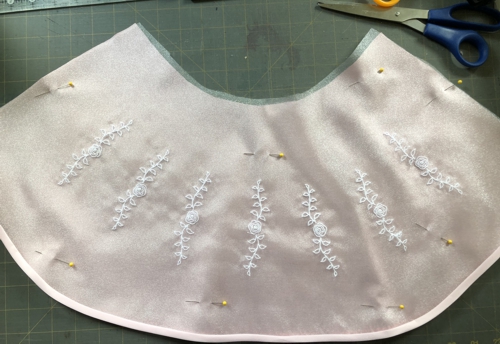
|
Finish the back raw edges of the skirt and overlay together.
|
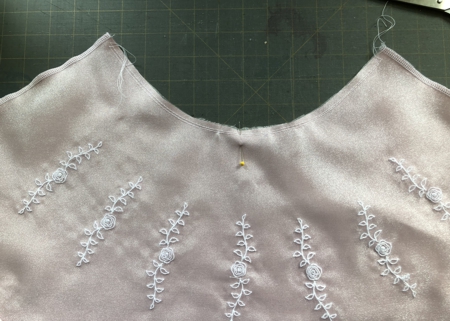
|
Attach the skirt to the bodice as described above.
|
Put the dress on a doll, mark the placement of the snaps. Sew on the snaps.
|
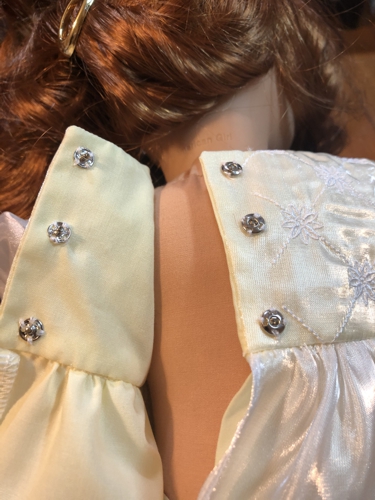
|
Starting from the hem, stitch up the back opening of the skirt approximately 6" - 6 1/2".
|
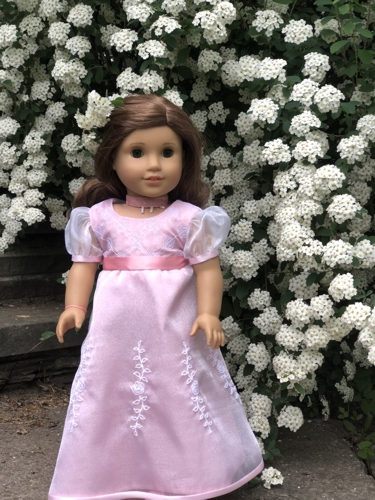
|
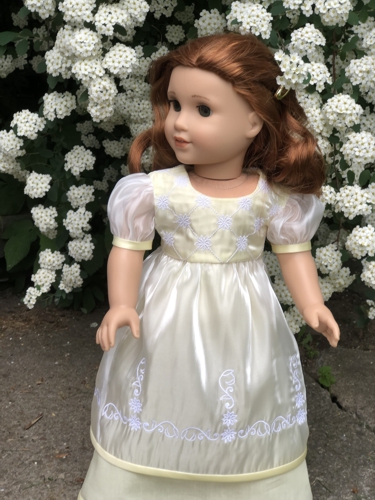
|
| Have fun! |
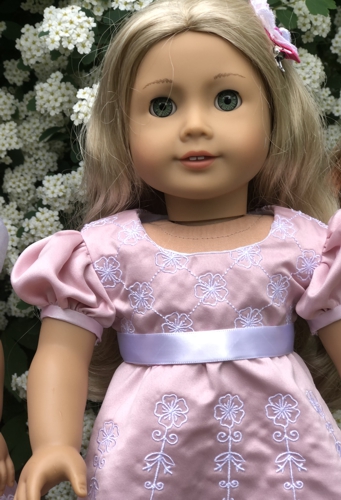
|
|
|
Back to Folk-Style Embellishment Set
|
Back to Projects Page
|
